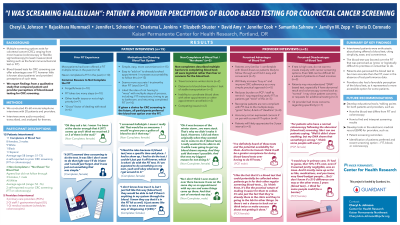Tuesday Poster Session
Category: Colorectal Cancer Prevention
P3169 - “I Was Screaming Hallelujah”: Patient and Provider Perceptions of Blood-Based Testing for Colorectal Cancer Screening
Tuesday, October 24, 2023
10:30 AM - 4:00 PM PT
Location: Exhibit Hall

Has Audio

Cheryl A. Johnson, MEd
Kaiser Permanente Center for Health Research
Portland, OR
Presenting Author(s)
Cheryl A.. Johnson, MEd1, Rajasekhara Mummadi, MD2, Jennifer Schneider, MPH1, Charisma Jenkins, 1, Elizabeth Shuster, MS1, David Amy, MA1, Jennifer Cook, 1, Samantha Sahnow, 1, Jamilyn Zepp, 1, Gloria Coronado, PhD1
1Kaiser Permanente Center for Health Research, Portland, OR; 2Kaiser Permanente, Hillsboro, OR
Introduction: Blood-based tests for colorectal cancer (CRC) screening can offer advantages over stool-based tests such as FIT. Yet, we know little about patients’ and providers’ perceptions. We report findings from a mixed-methods study reporting patient adherence and patient and provider perceptions of blood-based testing for CRC screening.
Methods: Patient participants were 45-75 and members of a large, integrated health system. Participants were mailed, but did not complete, a FIT through an organized FIT-screening program and were scheduled for a health-care encounter at any of nine clinical sites. Participants were randomized 1-to-1 to receive the offer of a blood-based test or usual care. Participants in the blood test conditions were consented and invited to complete a blood draw. We used purposive sampling to select and recruit patients (who did and did not complete the blood test) and providers/specialists who are involved in CRC screening. We administered telephone interviews using a semi-structured interview guide and recorded and transcribed interviews, then coded and analyzed content.
Results: We initially randomized 2,026 patients. 1,927 were still eligible following post-randomization exclusions (1,003 to usual care and 924 to blood draw offer; mean age: 60, 62% female, 80% non-Hispanic white). Of the 924 allocated to the blood-draw group, 548 (59.3%) were reached via phone, of which 280 (51.1%) scheduled an appointment with the research team. Three-month CRC screening proportions were 19.4 percentage points higher in the blood-test group vs. usual care (32.4% vs. 13.0%; p value < 0.01). We interviewed 15 patients (11 completed and 4 did not complete the blood test) and 5 providers (3 primary care providers, one gastroenterologist (GI), and one GI medical assistant). Patients were enthusiastic about a blood test, citing the simplicity, ease, convenience, and high perceived accuracy of the test. Providers were also receptive to a blood-based test, if adequate performance could be achieved and if they have information that informs patients of the pros and cons of blood-based screening versus other screening tests.
Discussion: Patients who were offered a blood-based test for CRC were more than twice as likely to complete CRC screening as patients allocated to usual care. Patients and providers were willing and enthusiastic about blood-based CRC screening tests. Future research focusing on performance and communication is needed.
Disclosures:
Cheryl A.. Johnson, MEd1, Rajasekhara Mummadi, MD2, Jennifer Schneider, MPH1, Charisma Jenkins, 1, Elizabeth Shuster, MS1, David Amy, MA1, Jennifer Cook, 1, Samantha Sahnow, 1, Jamilyn Zepp, 1, Gloria Coronado, PhD1. P3169 - “I Was Screaming Hallelujah”: Patient and Provider Perceptions of Blood-Based Testing for Colorectal Cancer Screening, ACG 2023 Annual Scientific Meeting Abstracts. Vancouver, BC, Canada: American College of Gastroenterology.
1Kaiser Permanente Center for Health Research, Portland, OR; 2Kaiser Permanente, Hillsboro, OR
Introduction: Blood-based tests for colorectal cancer (CRC) screening can offer advantages over stool-based tests such as FIT. Yet, we know little about patients’ and providers’ perceptions. We report findings from a mixed-methods study reporting patient adherence and patient and provider perceptions of blood-based testing for CRC screening.
Methods: Patient participants were 45-75 and members of a large, integrated health system. Participants were mailed, but did not complete, a FIT through an organized FIT-screening program and were scheduled for a health-care encounter at any of nine clinical sites. Participants were randomized 1-to-1 to receive the offer of a blood-based test or usual care. Participants in the blood test conditions were consented and invited to complete a blood draw. We used purposive sampling to select and recruit patients (who did and did not complete the blood test) and providers/specialists who are involved in CRC screening. We administered telephone interviews using a semi-structured interview guide and recorded and transcribed interviews, then coded and analyzed content.
Results: We initially randomized 2,026 patients. 1,927 were still eligible following post-randomization exclusions (1,003 to usual care and 924 to blood draw offer; mean age: 60, 62% female, 80% non-Hispanic white). Of the 924 allocated to the blood-draw group, 548 (59.3%) were reached via phone, of which 280 (51.1%) scheduled an appointment with the research team. Three-month CRC screening proportions were 19.4 percentage points higher in the blood-test group vs. usual care (32.4% vs. 13.0%; p value < 0.01). We interviewed 15 patients (11 completed and 4 did not complete the blood test) and 5 providers (3 primary care providers, one gastroenterologist (GI), and one GI medical assistant). Patients were enthusiastic about a blood test, citing the simplicity, ease, convenience, and high perceived accuracy of the test. Providers were also receptive to a blood-based test, if adequate performance could be achieved and if they have information that informs patients of the pros and cons of blood-based screening versus other screening tests.
Discussion: Patients who were offered a blood-based test for CRC were more than twice as likely to complete CRC screening as patients allocated to usual care. Patients and providers were willing and enthusiastic about blood-based CRC screening tests. Future research focusing on performance and communication is needed.
Disclosures:
Cheryl Johnson: Guardant Health Inc. – Independent Contractor.
Rajasekhara Mummadi: Guardant Health Inc. – Independent Contractor.
Jennifer Schneider: Guardant Health Inc. – Independent Contractor.
Charisma Jenkins: Guardant Health, Inc. – Grant/Research Support.
Elizabeth Shuster: Guardant Health Inc. – Independent Contractor.
David Amy: Guardant Health Inc. – Independent Contractor.
Jennifer Cook: Guardant Health Inc. – Independent Contractor.
Samantha Sahnow: Guardant Health Inc. – Independent Contractor.
Jamilyn Zepp: Guardant Health Inc. – Independent Contractor.
Gloria Coronado: Exact Sciences – Advisor or Review Panel Member. Guardant Health, Inc. – Grant/Research Support.
Cheryl A.. Johnson, MEd1, Rajasekhara Mummadi, MD2, Jennifer Schneider, MPH1, Charisma Jenkins, 1, Elizabeth Shuster, MS1, David Amy, MA1, Jennifer Cook, 1, Samantha Sahnow, 1, Jamilyn Zepp, 1, Gloria Coronado, PhD1. P3169 - “I Was Screaming Hallelujah”: Patient and Provider Perceptions of Blood-Based Testing for Colorectal Cancer Screening, ACG 2023 Annual Scientific Meeting Abstracts. Vancouver, BC, Canada: American College of Gastroenterology.
